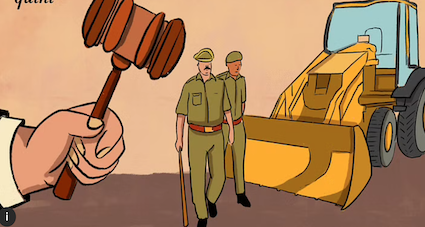Hyperbole and rhetoric produce echo chambers, and if something is repeated enough times, it starts sounding like the truth. That is what is happening in India right now with the “hate speech” and “demolition” controversy. So what is the truth?
The truth has a past and also a present.
The past has the way laws were codified in India by our Colonial and prior to that, our Mughal conquerors, both of whom had one thing in common – they believed in One Book. To understand that a bit better, it may be important to read the preface of the second Indian book that Y.B. Yeats wrote an introduction for, after the more famous Tagore’s Gitanjali.
It starts with trying to understand that there are only three eternal Nations, which have existed through history – Persia, India and China. Greece was eternal, too, but fell afoul of the attempt by its colonial neighbours from the days of Alexander onwards, to try to “organise” the rest of the world.
The world does not get “organised”, whether by a Book or by the Sword and certainly not by the power of Steam and Machines. The world, and the people therein, without going into esoterics, exist eternally by means of attaining workable balances.
One of these balances in this day and age is Law and Order. Especially in context with habitats in India.
The Law in India pertaining to illegal constructions, whether built on public land or otherwise, is extremely fluid. The Justice Delivery System in India is very Indian. We are a democracy, our people are not slaves under a colonial power, so the Law takes a very generous view on illegal constructions. Part of it is that it is very obvious that nobody wants to continue to live in an illegal construction – and the aspirational endeavour to grow economically as well as socially shall propel people towards legitimate habitats, is a very visible objective. With affluence in India, the movement can be seen in many parts of India, if we bother to look. Clear title on habitats is a stated objective of our Indian Government and documentation towards that is becoming better.
The second part of this is the Order that needs to be maintained, especially since illegal constructions tend to also be congested, and therefore the maintenance of good order as agreed to by society as well as law enforcement is a given. This maintenance of Order is also taken forward with a very generous view in the larger interest of those who are living or working within these areas of illegal construction. What may not be tolerated in other countries, say, by way of small shops and mini-commerce check-to-jowl with homes, is acceptable here. How else would, for example, weaker segments of society earn a livelihood if they were unable to run small cottage industries from home or near home?
Gender or religion aside, the term “illegal constructions” is winked at all over India, at some of the most amazing of locations top-down I may add. This is all about a fine balance, rather than organising, and is in a rather simplistic point of view, the main reason that Indian civilisation is eternal.
In this easy balance, which let us be frank, is for a larger benefit – something like giving the weaker sections of society an opportunity to elevate themselves when it is visible that they simply may not be able to acquire a legitimate home – comes turbulence. Someone, somewhere, makes “hate speech” – not being competent enough nor holding the authority to decide on “hate speech”, the matter goes up to the Law.
Having approached a forum for the delivery of justice, the Law, it is then assumed that Order shall not be disturbed.
But then, someone, somewhere, disturbs order. When some people, visibly break the law, then order has to be used to bring back the balance. This turbulence caused by violent behaviour is not in anyone’s interest.
The maintenance of Order is in everyone’s interest. Even the neighbours of those whose houses were demolished, especially the neighbours, will agree. Maintain Order. The Law will take its own course. And it always has in India, before, during and after the Mughals and Colonials.
Because that was our Law. It was all about Balance. Which in turn made it Eternal. Obviously people who miss the Mughals or the Colonials, who want them back, will not like this balance.
(Veeresh Malik was a seafarer. And a lot more besides. A decade in facial biometrics, which took him into the world of finance, gaming, preventive defence and money laundering before the subliminal mind management technology blew his brains out. His romance with the media endures since 1994, duly responded by Outlook, among others.)


